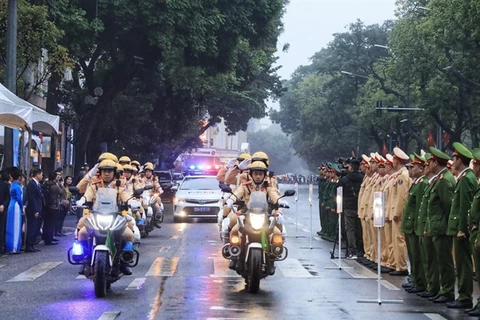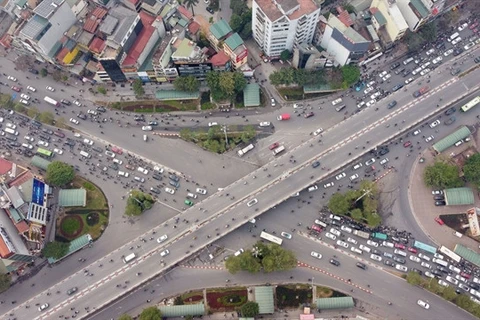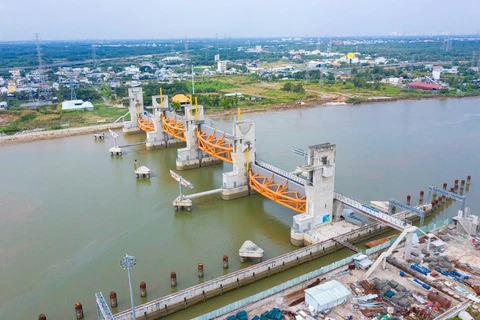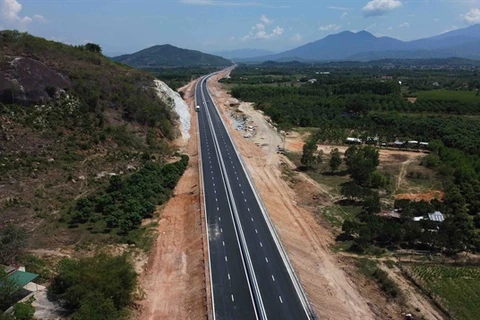Hanoi (VNS/VNA) - Deputy Prime Minister Tran Luu Quang has highlighted that restricting the use of personal vehicles in major cities and encouraging the use of public transportation would be the key solutions to achieve the sustainable goal of reducing traffic accidents and alleviating traffic congestion.
This would help build a safe, convenient, and eco-friendly transportation system, he said on July 6 at a conference on implementing Directive No. 23-CT/TW issued by the Party Central Committee’s Secretariat.
The hybrid conference took place at the Ministry of Public Security’s hall, with more than 35,000 on-site and online participants at 63 localities nationwide.
In his opening speech, Minister of Public Security General To Lam stated that the Party Central Committee’s Secretariat of the 13th tenure issued Directive No 23-CT/TW on May 25 on ensuring traffic order and safety on roads, railways and inland waterways and overcoming traffic jams.
Lam emphasised that the Party and State have paid great attention to the management and development of transportation. The Party Central Committee’s Secretariat has issued directives on ensuring traffic order and safety every ten years, in 2003, 2012, and 2023.
Over the 11 years since Directive 18, the people’s compliance with traffic laws has undergone a clear transformation, leading to a significant decrease in the number of deaths, injuries, and losses caused by traffic accidents.
“In 2022, there was a decrease of about 3,000 deaths compared to 2012. In the first six months of this year alone, there has been a decrease of 548 deaths due to traffic accidents compared to the same period of last year,” he said.
However, the recent developments have not yet met the requirements. The situation of traffic order and safety remains complicated with serious losses caused by traffic accidents.
Over the past ten years, Vietnam has experienced an average of 20,000 traffic accidents each year, resulting in 7,000 deaths and 16,000 injuries. Of that, about 70% of the victims were of the working-age population, leaving severe consequences for society.
The minister stressed that the State management of traffic order and safety in some localities still had shortcomings, with unclear responsibilities in each sector, leading to reduced effectiveness and efficiency.
"The issuance of Directive No 23 by the Party Central Committee is very timely and contributes to a stronger transformation in ensuring traffic order and safety to serve the country's socio-economic development tasks," he affirmed.
Lam said although the number of accidents, deaths and injuries in 2022 saw a decrease of 37%, 29% and 44%, respectively, compared to those of 2012, the situation of traffic order and safety still remained complex.
Major General Nguyen Van Long, Deputy Minister of Public Security, stated that there are many cases of serious violations of traffic laws, especially those involving the use of alcohol resulting in fatal accidents or resistance against duty officers.
The State management of traffic order and safety in certain areas, such as the operation of driving training centres and vehicle register centres, remained ineffective.
The issuance of legal documents regarding the work of ensuring traffic order and safety also had shortcomings and a lack of consistency in clearing State management’s responsibilities among ministries and sectors.
Traffic congestion occurs daily during peak hours in major urban areas, major national routes, highways, and entrances to large cities.
In particular, Long said, resistance against duty officers caused severe consequences. As many as 362 cases have been recorded in the past ten years, killing four police and injuring 194 others.
At the conference, Deputy PM Quang discussed measures to effectively implement the goals of Directive No 23-CT/TW set by the Party Central Committee.
The Party Central Committee requested party committees at all levels, local authorities, the Fatherland Front, and political and social organisations to focus on six groups of key solutions outlined in Directive No 23.
Firstly, it was necessary to strengthen leadership, guidance, and supervision to strictly implement the Party's guidelines, policies, and laws regarding ensuring traffic order and safety.
Second, the legal system should be improved while responsibilities in State management of transportation should be clearly defined.
Communication, dissemination, and legal education needed to be strengthened to raise awareness and responsibility of officials, party members, and the public regarding traffic order and safety.
The State management authorities should focus on resources for building and developing transportation infrastructure, promoting the application of science, technology, and international cooperation in the field of transportation.
They must enhance management capacity and cooperation among forces in ensuring traffic order and safety. In particular, they should prioritise investment in public transportation and eco-friendly public vehicles.
Finally, traffic congestion in key urban areas such as Hanoi and Ho Chi Minh City must be addressed by developing dynamic transportation systems in big cities and limiting the use of personal vehicles.
Quang suggested that ministries, sectors, and local authorities develop appropriate plans and clearly assign responsibilities and conduct regular inspections to ensure traffic order and safety in the new situation./.
This would help build a safe, convenient, and eco-friendly transportation system, he said on July 6 at a conference on implementing Directive No. 23-CT/TW issued by the Party Central Committee’s Secretariat.
The hybrid conference took place at the Ministry of Public Security’s hall, with more than 35,000 on-site and online participants at 63 localities nationwide.
In his opening speech, Minister of Public Security General To Lam stated that the Party Central Committee’s Secretariat of the 13th tenure issued Directive No 23-CT/TW on May 25 on ensuring traffic order and safety on roads, railways and inland waterways and overcoming traffic jams.
Lam emphasised that the Party and State have paid great attention to the management and development of transportation. The Party Central Committee’s Secretariat has issued directives on ensuring traffic order and safety every ten years, in 2003, 2012, and 2023.
Over the 11 years since Directive 18, the people’s compliance with traffic laws has undergone a clear transformation, leading to a significant decrease in the number of deaths, injuries, and losses caused by traffic accidents.
“In 2022, there was a decrease of about 3,000 deaths compared to 2012. In the first six months of this year alone, there has been a decrease of 548 deaths due to traffic accidents compared to the same period of last year,” he said.
However, the recent developments have not yet met the requirements. The situation of traffic order and safety remains complicated with serious losses caused by traffic accidents.
Over the past ten years, Vietnam has experienced an average of 20,000 traffic accidents each year, resulting in 7,000 deaths and 16,000 injuries. Of that, about 70% of the victims were of the working-age population, leaving severe consequences for society.
The minister stressed that the State management of traffic order and safety in some localities still had shortcomings, with unclear responsibilities in each sector, leading to reduced effectiveness and efficiency.
"The issuance of Directive No 23 by the Party Central Committee is very timely and contributes to a stronger transformation in ensuring traffic order and safety to serve the country's socio-economic development tasks," he affirmed.
Lam said although the number of accidents, deaths and injuries in 2022 saw a decrease of 37%, 29% and 44%, respectively, compared to those of 2012, the situation of traffic order and safety still remained complex.
Major General Nguyen Van Long, Deputy Minister of Public Security, stated that there are many cases of serious violations of traffic laws, especially those involving the use of alcohol resulting in fatal accidents or resistance against duty officers.
The State management of traffic order and safety in certain areas, such as the operation of driving training centres and vehicle register centres, remained ineffective.
The issuance of legal documents regarding the work of ensuring traffic order and safety also had shortcomings and a lack of consistency in clearing State management’s responsibilities among ministries and sectors.
Traffic congestion occurs daily during peak hours in major urban areas, major national routes, highways, and entrances to large cities.
In particular, Long said, resistance against duty officers caused severe consequences. As many as 362 cases have been recorded in the past ten years, killing four police and injuring 194 others.
At the conference, Deputy PM Quang discussed measures to effectively implement the goals of Directive No 23-CT/TW set by the Party Central Committee.
The Party Central Committee requested party committees at all levels, local authorities, the Fatherland Front, and political and social organisations to focus on six groups of key solutions outlined in Directive No 23.
Firstly, it was necessary to strengthen leadership, guidance, and supervision to strictly implement the Party's guidelines, policies, and laws regarding ensuring traffic order and safety.
Second, the legal system should be improved while responsibilities in State management of transportation should be clearly defined.
Communication, dissemination, and legal education needed to be strengthened to raise awareness and responsibility of officials, party members, and the public regarding traffic order and safety.
The State management authorities should focus on resources for building and developing transportation infrastructure, promoting the application of science, technology, and international cooperation in the field of transportation.
They must enhance management capacity and cooperation among forces in ensuring traffic order and safety. In particular, they should prioritise investment in public transportation and eco-friendly public vehicles.
Finally, traffic congestion in key urban areas such as Hanoi and Ho Chi Minh City must be addressed by developing dynamic transportation systems in big cities and limiting the use of personal vehicles.
Quang suggested that ministries, sectors, and local authorities develop appropriate plans and clearly assign responsibilities and conduct regular inspections to ensure traffic order and safety in the new situation./.
VNA
























